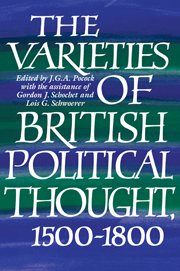Book contents
6 - The later Stuart age
Published online by Cambridge University Press: 04 August 2010
Summary
In 1985 J. G. A. Pocock remarked that no comprehensive history of British political thought in the early modern period has ever been successfully written. The failure, although regrettable, is also easily understood. Given the extraordinary volume and variety of discourse in the three-century bridge from the medieval to the modern state, the task of writing its history has been nothing less than daunting. But if the lack of a panoramic treatment of political thought for the entire period from 1500 to 1800 is conspicuous, even more striking is that a much smaller segment of that epoch, the second part of the seventeenth century, has been neglected almost entirely – at least in any book-length exploration. Whereas there have been a number of more narrowly focused studies, an all-embracing history of the post-Interregnum era has still to be undertaken.
In contrast, the first part of the century has been remarkably well served. Among those works dealing comprehensively with early Stuart political thought are the contributions of J. W. Allen and Margaret Judson, and more recently of J. P. Sommerville. For 1645 to 1660 there is the work of Perez Zagorin. None of the four, however, ventures past the end of the republic. The result is that once we get to 1660 and to that fundamentally important political era stretching from the Restoration through the Revolution, there are no general histories of political thought to be found.
Why this should be so is by no means clear.
- Type
- Chapter
- Information
- The Varieties of British Political Thought, 1500–1800 , pp. 180 - 208Publisher: Cambridge University PressPrint publication year: 1994
- 1
- Cited by



